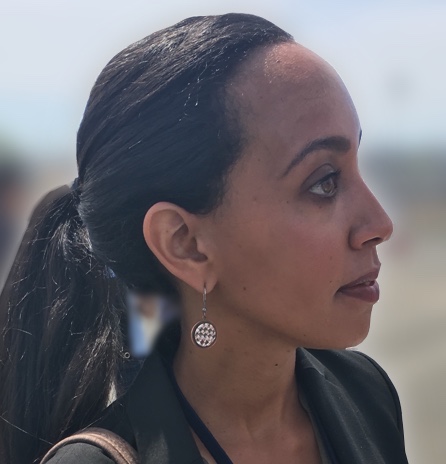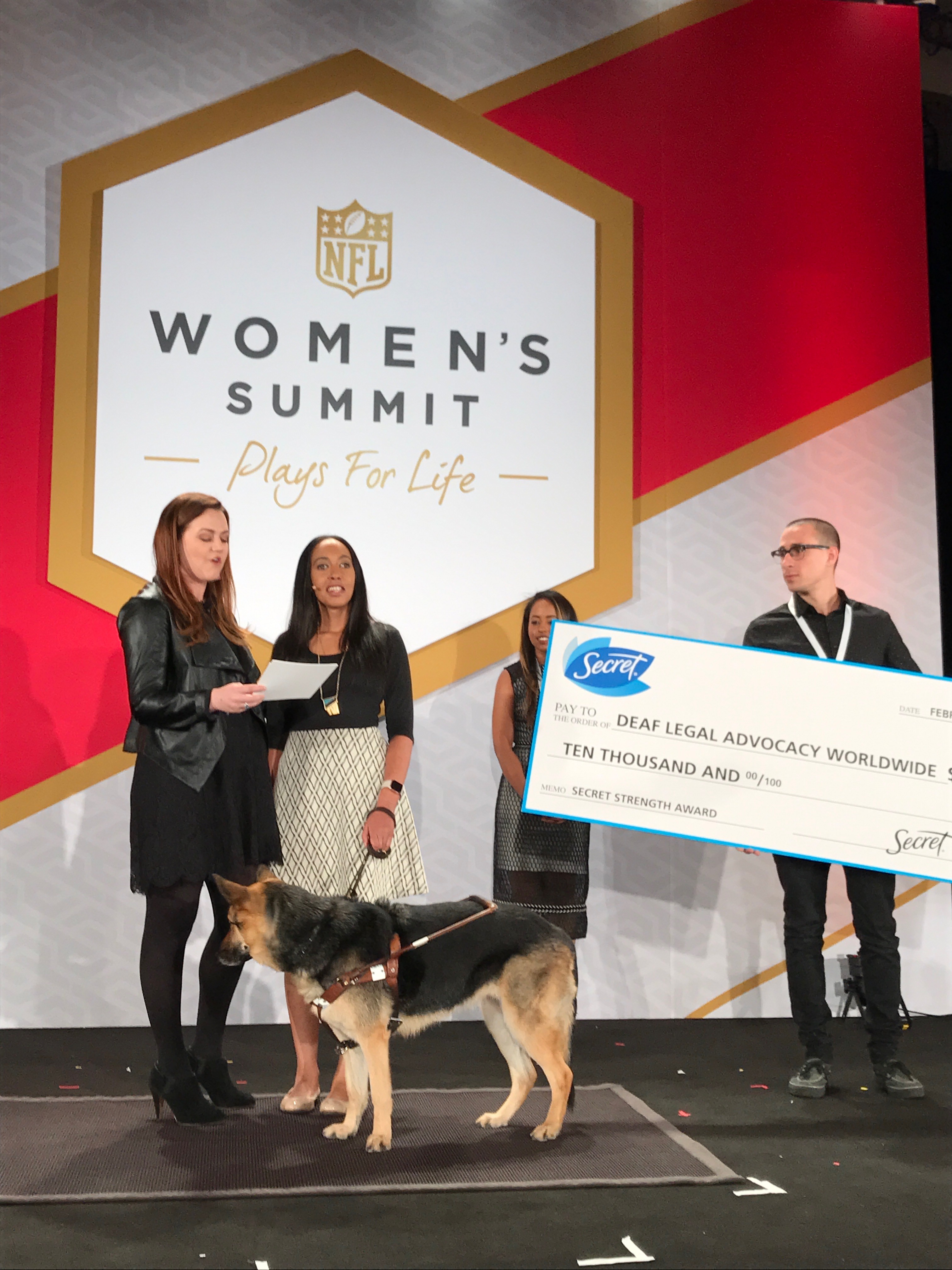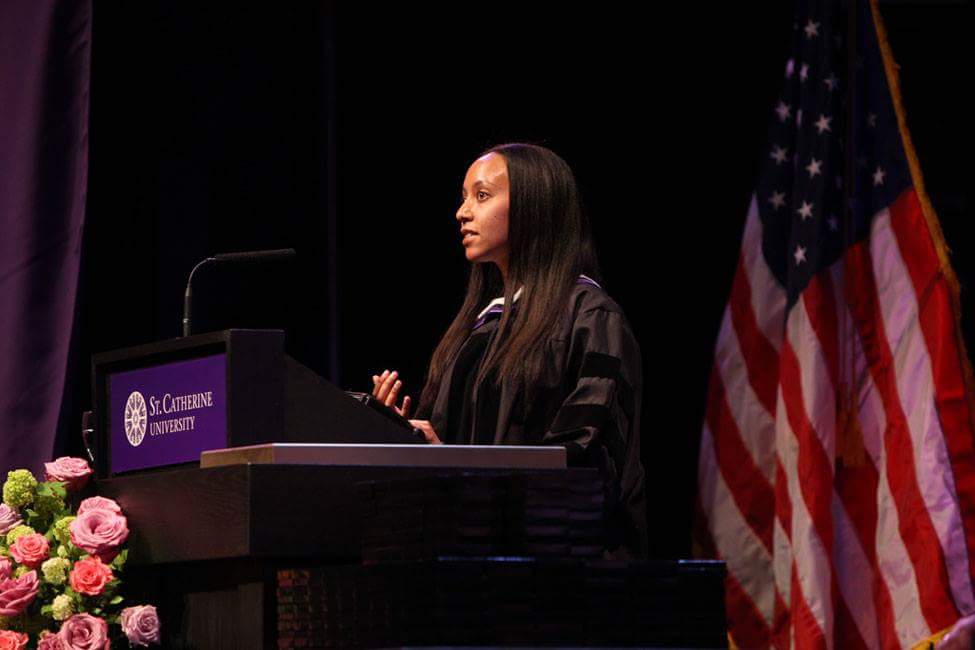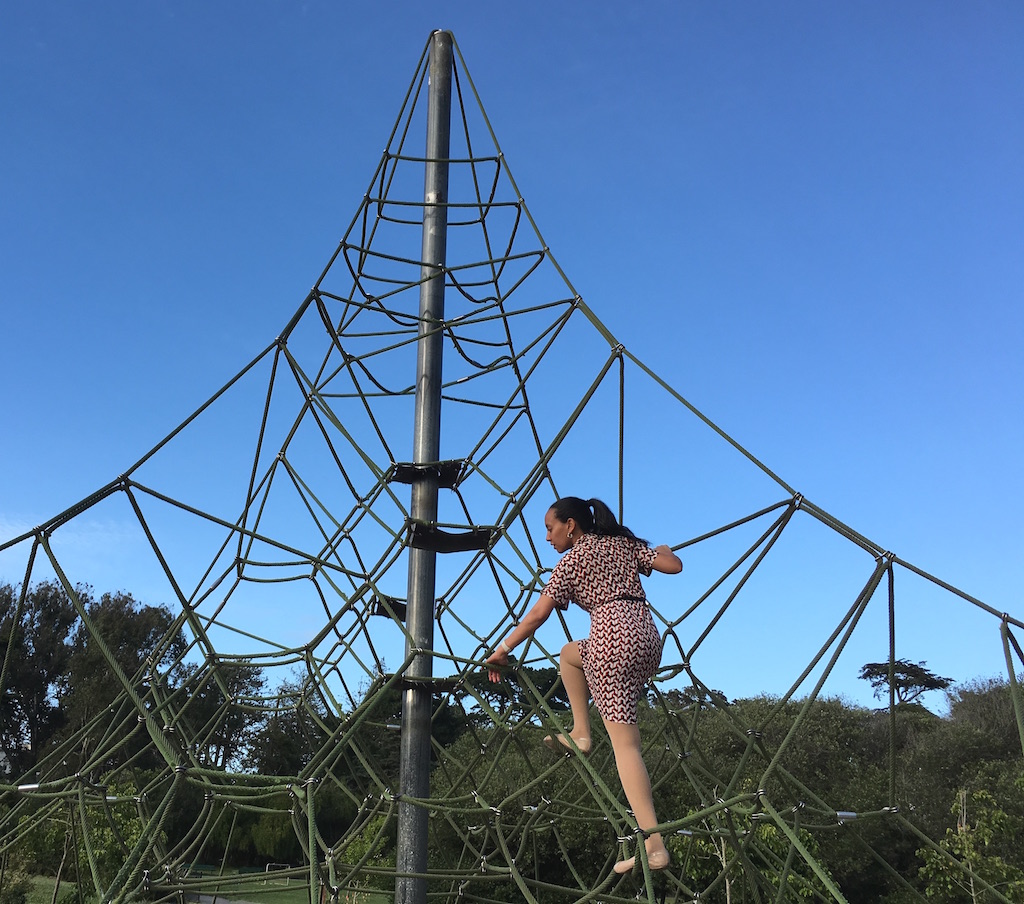Transcript
[ Music ]
Felice: Ladies and gentlemen, please join me in welcoming on stage, Haben Girma.
[ Applause ]
Haben: Good afternoon. Thank you for the introduction, Felice.
My name is Haben Girma. I work as an accessibility and inclusion advocate, teaching organizations
and individuals to design with accessibility in mind.
I’m Deafblind. Deafblindness encompasses a wide spectrum of vision and hearing loss. I have a little bit of hearing, and a little bit of vision. I see maybe about 1% of what the average sighted person sees. By identifying as Deafblind, I’m telling the world that I’m part of a community where knowledge gained through touch is equal in value to knowledge gained through sight, sound, or other means. Our world is incredibly diverse, and when we design apps, that celebrate that diversity, and recognize that diversity, we all benefit. So I identify as Deafblind to tell the world to design non-visual access, and non-auditory access to help maximize communication. This is tricky for some people.
One of my best friends, when she first met me, wasn’t sure how to say hi. She was sitting next to me in one of our classes at law school. She waved hi, but I couldn’t see it. She voiced, “Hi,” but I couldn’t hear it. It was our first day of international law class, and she wasn’t thinking about international law. She was thinking about how to get my attention. After a while, during the class, she came up with a plan. She did the most logical thing for a student. She went onto Facebook and sent me a message saying, “Hi, Haben, I’m sitting right next to you.”
Technology has facilitated access to communication for a lot of people. And when apps are designed with accessibility in mind — iMessages, Mail, other communication tools — people with disabilities like myself can use them and are able to connect and share information with people.
I saw that Facebook message my friend sent later, and I reached out to her and we were able to communicate. I explained the various communication methods I use.
Technology facilitates connections when both parties are willing and interested in practicing inclusion. I want to share a photo that highlights some of the communication methods I use. In this photo I’m standing at a table, and I’m reading from a digital Braille display. Digital Braille, comes through a device with mechanical pins that pop up to form Braille letters. I read these letters by feeling the dots. Braille is a tool, not a language. I primarily use English Braille. I can read Spanish Braille, and I’ve seen Braille in many different languages. I was once on a ferry going from Italy to Greece. I remembered feeling a bit lost on the ferry because all of the signs were in Greek Braille. So Braille is a tool and the Braille display is a device that produces this information in Braille.
Also in the photo, President Obama is standing at the table and he’s typing on an Apple wireless keyboard. What’s being typed is being sent to the digital Braille display. I’m reading what’s being typed. This is a communication method that I developed.
Deaf individuals have been developing communication tools for hundreds of years. Communities around the world have developed sign languages. In the United States, the dominant sign language
is American Sign Language. Which is heavily influenced by French Sign Language.
My brother is Deafblind. When he communicates with me he uses sign language. When he’s signing I put my hand over his hand, and feel what he is signing. When he wants to listen to me, he’ll put his hand over my hand, and feel what I’m signing. Tactile sign language is another form of communication that has developed, that has been developed by the Deafblind community.
Another form is print on palm, where people write on palms. They could write in English characters, Mandarin, and other forms of characters.
Humans are incredibly creative. We design new ways for each of us to connect and engage
and share information.
Another form of communication is dance. [Video of Haben salsa dancing.] Dance is expressed in many different forms. Some Deaf individuals who are sighted will watch the other dancers and will
pick up the beats by watching the other dancers. Other individuals will watch the musicians, and pick up the beat by watching the fingers and instruments of the musicians. People are very creative and find solutions.
For me, dance is all about the connection. Salsa is like a kind of sign language. People communicate information, rhythm, beat, music, emotions, through their hands. Some of the signals
in salsa, are visual and the people I dance with will switch them around and switch those visual
signals to physical signals. Through dance we celebrate joy, connection, and community.
Communities that celebrate diversity will find ways to be inclusive. They’ll adapt strategies to make sure everyone can participate and be involved. So dance is one community in which I belong, that practices inclusion.
When I join a community the first question people usually ask me is, “How do you communicate?” The second question people usually ask me is, “Have you heard of Helen Keller?”
[Laughter]
Helen Keller was an amazing advocate. She lived from 1880 to 1968. She advocated for
women’s rights, disability rights, worker’s rights. She spent her whole life advocating, and yet many stories of Helen reduce her to one theme. She succeeded despite her disability. Disability never
holds anyone back. Disability is not something that people need to overcome. The barriers that exist
are created by society, and it’s up to every single one of us to work together to remove those barriers.
Helen was successful because she was part of communities that chose to practice inclusion. She went to Radcliffe College, and Radcliffe provided books in Braille, and made sure she had interpreters. They worked to ensure access and inclusion.
Not every community practices inclusion. Harvard wouldn’t admit Helen. Back then Harvard only admitted men. Helen’s disability didn’t hold her back. Her gender didn’t hold her back. It was the community of Harvard that chose to deny access to women.
As another example, Helen’s family would not allow her to experience marriage. Helen fell in love,
secretly got engaged, but her family prevented her from marrying the person she loved. Helen’s disability didn’t stop her from feeling love. She wrote extensively about love. But her family, her community, chose to create insurmountable barriers.
All the barriers that exist are created by society. As members of society, we play a role in removing those barriers and making sure that everyone can access information and opportunities.
We’ve come a long way since Helen’s time. More and more communities celebrate diverse families and relationships. Harvard eventually made the smart decision to open its doors to women. And now technology creates more opportunities for people to connect. I often wonder, what would Helen have accomplished, what freedom would she have enjoyed, if she had access to the world of apps
that are accessible to people with disabilities?
One of the features Apple offers for developers is called VoiceOver. VoiceOver is a screen-reader that, when an app is compatible, will produce information in speech or digital Braille for users of the app.
I’m going to share a demonstration video that shows how VoiceOver works.
[Scene, Haben sitting at a table with a Braille display and iPhone.]
Haben: A screen-reader is a program that converts graphical information to speech or digital Braille. The screenreader on the iPhone is called VoiceOver. VoiceOver also works on the Mac, iPad, and the Apple Watch. So, when I’m using my phone, I use VoiceOver. VoiceOver can speak out loud and send information to the digital Braille display.
[iPhone Screen]
VoiceOver: News. Checking for…News. National Geographic. Unread. World’s largest rodents on lam from Toronto zoo.
Haben: I’m panning right on the braille display using the advance forward buttons. If I wanted to instead use hand gestures on the iPhone, I could flick right with one finger. To open an item, I can double-tap anywhere on the screen.
VoiceOver: Text size. Caption. Title. World’s largest…Title. After escaping from the High Park Zoo in Canada, two capybaras have eluded capture for over three weeks. By Jason Bittel. Published June 9. Most people do their best to avoid rodents of unusual size, but after a pair of capybaras escaped from Toronto’s High Park zoo — Alert: Gordon. Hi! I’m at the door. Sushi. Pot of food. Fish cake with swirl design.
[Scene, Haben at the table.]
Haben: (Laughing) My friend’s at the door, so I’m just gonna let him know.
[iPhone screen.]
VoiceOver: Close Button. Reply Button.
[Scene, Haben typing on Braille display.]
[iPhone screen.]
VoiceOver: Messages notification. Hang in there! I’m almost done with this demo. Send Button.
[Scene, Haben at the table.]
Haben: VoiceOver has allowed me to access more information: news, mail, and messages, and it’s also a way for people to know when friends are at the door. Thanks for watching. Bye!
[ Applause ]
[Scene, Haben speaking on stage.]
Haben: Apple has a variety of accessibility features. VoiceOver is one which you just saw. Another one, support for Dynamic Type. When you support Dynamic Type people who are low vision and need larger font sizes can have better access to your apps. Another feature is Captioning. Support for Captioning allows individuals who are deaf or hard of hearing, to access the audio content of your videos. Support for Assistive Devices like Braille displays, switch controls… Switch controls benefit individuals with limited mobility. So these are some of the features that if you design for your apps to be accessible, will allow greater access for people with disabilities. But don’t stop there, keep innovating, keep thinking of new ways for people to
access your information.
Our goal is to have a world where all the apps in the App Store are accessible. Right now if I need an app for anything from travel to shopping, I need to spend hours looking for an accessible app. And sometimes, there isn’t an accessible option. Our goal is to have every app, and I mean every single
app, to be accessible.
Several years ago, I went to China for the first time. When I arrived in my hotel in Beijing I did what I always do when I go somewhere new. I explored. And while exploring the room, I discovered an unidentifiable object. It felt a little like a piece of fruit, but I’d never seen anything like it before. I was wondering: should I taste it?
[Laughter]
I was super curious to find out what it was, but not curious enough to taste an unknown object.
[Laughter]
So instead I got out my camera, on my iPhone, took a picture, and texted it to a friend,
asking: what on earth is this? Is it safe to eat?
I learned that it was dragon fruit. And I discovered I like dragon fruit. Now imagine a lot
of people thinking, why would a camera app need to be accessible? Why would blind people
ever take pictures? We take pictures for the same reasons sighted people take pictures. To capture moments, to share experiences with friends.
Our goal is to make sure all apps are accessible. Try not to make assumptions about what people with disabilities can and can’t do. Instead, strive for inclusion. And as you strive for
inclusion for your apps, here are a few things to keep in mind.
It helps to plan for accessibility from the start. It’s much easier, it saves you resources if you plan for accessibility, from the very start. I’ll give an example from the physical world. Imagine someone builds a skyscraper but realizes they forgot to put an elevator. Tears down part of the building, and then installs an elevator. That’s more time consuming and drains resources. It would be much
easier to just plan for an elevator from the start. Same principle applies in the digital world. You save yourself resources when you can have accessibility from the very start.
And there are engineers with disabilities, designers with disabilities, testers with disabilities, to help you with the process. There are all so many disability organizations in the U.S. and around the world, to help provide feedback. Engage with us, from initial design to app updates.
Apple also has a lot of resources to help you with this process. There are online tutorials, documentation, accessibility guidelines for iOS. Tomorrow evening here, at WWDC, we’re going to have an accessibility mixer. Come and join us. I’ll be there to answer questions, lots of accessibility
people will be there, including developers who’ve gone through this process of making sure their
apps are accessible. So these are resources that are available to you and will help you design apps that are accessible.
Accessibility benefits your consumers, but it also benefits you. Accessibility has many
benefits for you because one: people with disabilities are the largest minority group. About 1 in 5 Americans lives with a disability. So when you design with accessibility in mind, you get access to
more customers, more people can benefit from your services.
Another thing to keep in mind is accessibility increases access for everyone, including non-disabled users. For example, when you caption your videos, and you add alternative text to your images, more text is associated with your content. And because of that, it’s easier for people to find your content through powerful keyword searches. The videos from WWDC are captioned and those captions, produce a transcript and anyone can do a keyword search and find exactly where in the
video a topic was discussed. This is an example of how a feature that benefits the Deaf community, also benefits the greater community.
But the most important point is innovation. Disability drives innovation. When you think about new ways of accessing information, new ways for people to connect, and engage with each other, you’re going to find yourself designing the next best thing.
Throughout our history disability has sparked innovation, that benefits all of us today. Many of the products we use today can be traced back to disability.
In 1808, an Italian inventor named Turri built one of the first working typewriters. He wanted a solution for producing print that didn’t require vision. That someone can do by touch. Now Turri had a lover who was blind, and he wanted her to be able to write him love letters. So he designed the first, one of the first working typewriters as a possible solution. And now today, around the world, we have lots of touch typists, lots of people who use keyboards without using vision, both sighted typists and blind typists.
More recently, one of the fathers of the internet, Vinton Cerf, is hard of hearing, and his wife is also hearing impaired, and they were looking for a solution that would allow them to communicate without using hearing. And to communicate from afar. Disability drives innovation, not just by non-disabled
inventors but by people with disabilities as well. Vinton ended up developing one of the earliest email protocols, and electronic mail was one way for them to communicate from afar. And now, just about
everybody uses email, and sends text messages. Solutions designed with disability in mind end up benefiting the entire community.
Central to innovation is exploration. I’m going to share a photo of a jungle gym. A jungle gym
highlights exploration. There are multiple ways to get to the top, there isn’t a right or wrong way to climb, there isn’t a right or wrong path to take. When I’m climbing I can’t see the ropes. This is about, 20 feet tall. It’s a pyramid shaped, rope-based jungle gym. When I climb, I reach out, explore, until I find the ropes, until I find the solutions.
There are many, many, many different ways to climb: by touch, by sight, by sound. You could have someone down on the ground offering voice guidance. If you have a mobility disability, you can design an assistive climbing device. Exploration values alternative techniques and the more open you are to seeing the world in multiple perspectives, the more likely you are going to design, develop
the next big thing.
One area where we rarely seek innovation is haptics. Haptics is the concept of communicating
information through touch. I have an Apple Watch, and it taps my wrist twice when I get a message. That’s a form of communication based on haptics, touch.
I recently went surfing, and that whole experience was about haptics. Here’s a photo of me on a tandem board. A tandem board is a large board. I’m standing near the front and in the back is
the surf instructor, Matt Allen from Maui Surf Academy. He was using tactile signals. I could also feel the power of the waves vibrating through the surf board, the wind, the sun, the cold water. Skin is our largest organ, yet we’ve barely explored the potential of haptics. There’s a lot of potential
at this intersection of haptics and technology.
Keep exploring, keep innovating, keep designing apps that are going to increase access for everyone. As you go through this process, engage with the disability community, plan for accessibility from the start and design knowing that it’s going to benefit you.
Thanks for listening everyone.
[ Applause ]



